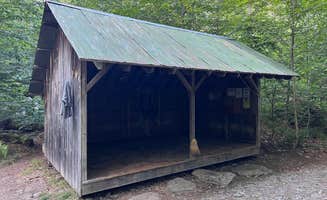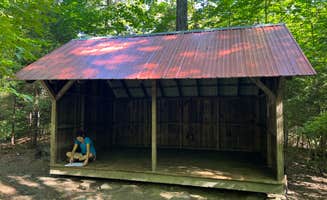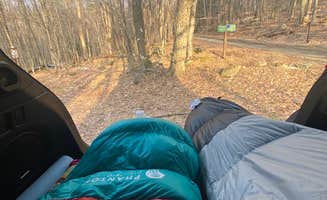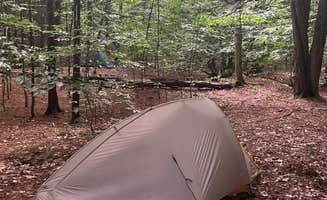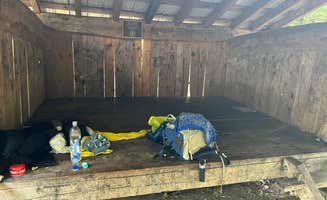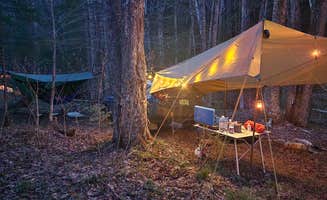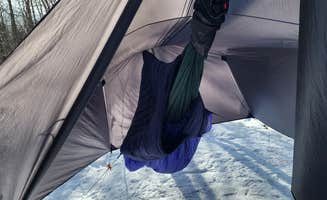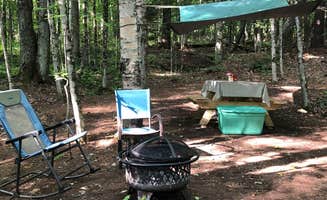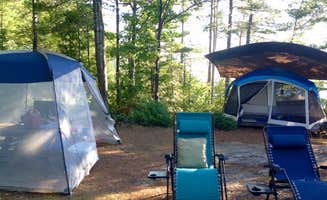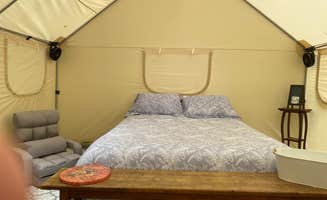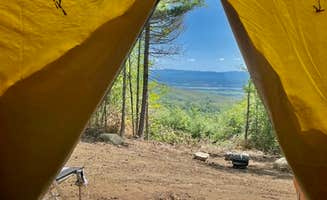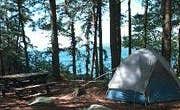Tent camping near Plymouth, Vermont centers around the Green Mountain National Forest, where elevations range between 900-2,000 feet. Forest service roads provide access to numerous primitive sites, though spring mud season typically affects accessibility from March through mid-May. Overnight temperatures can drop into the 40s even during summer months, requiring proper insulation regardless of season.
What to do
Swim in natural pools: At Little Rock Pond Group Camp & Shelters, visitors find exceptional swimming opportunities. "The pond is surprisingly warm for its altitude and it's home to two Common Loons," notes Meredith C., who also mentions a "huge jumping rock on the far side of the pond."
Explore forest service roads: Michigan Brook Road offers multiple dispersed campsites along its length. "Drive in about a mile after the parking lot!! Can use car to get in! There's 3 camping spots. 1 before the bridge and 2 after the bridge!" explains TRUCKER C., providing specific navigation advice for first-time visitors.
Access the Appalachian Trail: Thistle Hill Backcountry Shelter on the AT serves as a strategic access point. Justin P. describes it as "a peaceful place to stop in the woods" with "a one-story standard AT shelter with a fire ring and a bench for seating."
What campers like
Double-decker shelter access: Happy Hill Backcountry Shelter offers unique sleeping arrangements. "The shelter had a ground floor and a loft but each floor could maybe fit 4-5 people comfortably," explains Justin P., who appreciates how "folks could decide to sleep up there while others were down below, either cooking, arriving, or departing."
Backcountry privacy: The remote nature of sites appeals to many visitors. "Love this site! The very last spot on the right hand side. If you've reached the closed gate you've missed the site!" shares Thomas and James S. about the Last Light on Michigan Brook location.
Affordability: Most sites in the Green Mountain National Forest are free, while managed shelters have minimal fees. At Little Rock Pond, Meredith C. notes the site "costs only $5 per person per night" while offering substantial amenities including "a big 3-wall cabin with room for at least 12, several tent platforms" and "a composting privy."
What you should know
Water availability varies: Many campers encounter seasonal water limitations. Justin P. mentions that at Winturri Backcountry Shelter, "Water was running when I was there in mid-August from a spring close to the shelter," but notes this isn't guaranteed year-round.
Road conditions change seasonally: Higher clearance vehicles become necessary during wet periods. "Some parts are muddy and very rough. Higher clearance would be advised!!!" warns Thomas and James S. about Michigan Brook Road.
Winter considerations: Winter camping requires additional planning. Keegz M. shares from experience: "The main road to the parking lot is plowed and sanded. However if you would like to continue down the service road during winter months I would highly recommend snowshoes or a snowmobile. I attempted to bring my car and was stuck overnight."
Communication limitations: Cell service is nonexistent in many camping areas. Keegz M. emphasizes that Michigan Brook Road "DOES NOT PROVIDE CELL PHONE SERVICE OR WIFI CONNECTION," but notes that "if you walk to the end of upper Michigan Brook road you will have cell phone service."
Tips for camping with families
Look for level tent areas: Stony Brook Backcountry Shelter provides comfortable terrain for family camping. Justin P. points out "there were a few large tent areas where multiple tents could fit and which looked quite level," making setup easier for groups with children.
Consider drive-in accessibility: Families with young children may prefer sites closer to parking. Maggie F. recommends Michigan Brook: "We camped near the beginning of the road but would recommend driving down if you can because you can camp next to the river after you cross the bridge."
Research bathroom facilities: Private facilities vary significantly between sites. At Stony Brook, Justin P. notes "The privvy looked brand new and was more spacious than most on the trail," which can make a significant difference for families with young children.
Pack adequate water: With unreliable water sources, families should bring extra supplies. For Little Rock Pond, Meredith C. mentions "Water is available at a creek and a spring nearby," but during dry periods, these sources may diminish.
Tips from RVers
Check road clearance first: Michigan Brook Road Camping requires careful vehicle assessment. "Road goes in pretty far. Some parts are muddy and very rough. Higher clearance would be advised!!!" cautions Thomas and James S.
Scout potential sites before committing: Longer vehicles require advance planning. Goose10091203 advises: "I found most of the spots to be on the road before the GPS marker. Few nice ones near the creek. I stayed at one on top of a hill—lots of space at mine."
Consider seasonal limitations: Winter RV camping presents significant challenges. Keegz M. learned this firsthand: "I attempted to bring my car and was stuck overnight but was able to dig myself out the next morning," underscoring the importance of proper vehicle selection and winter equipment.


